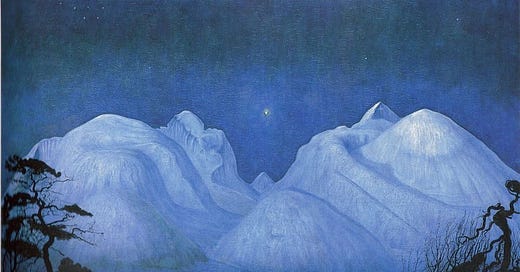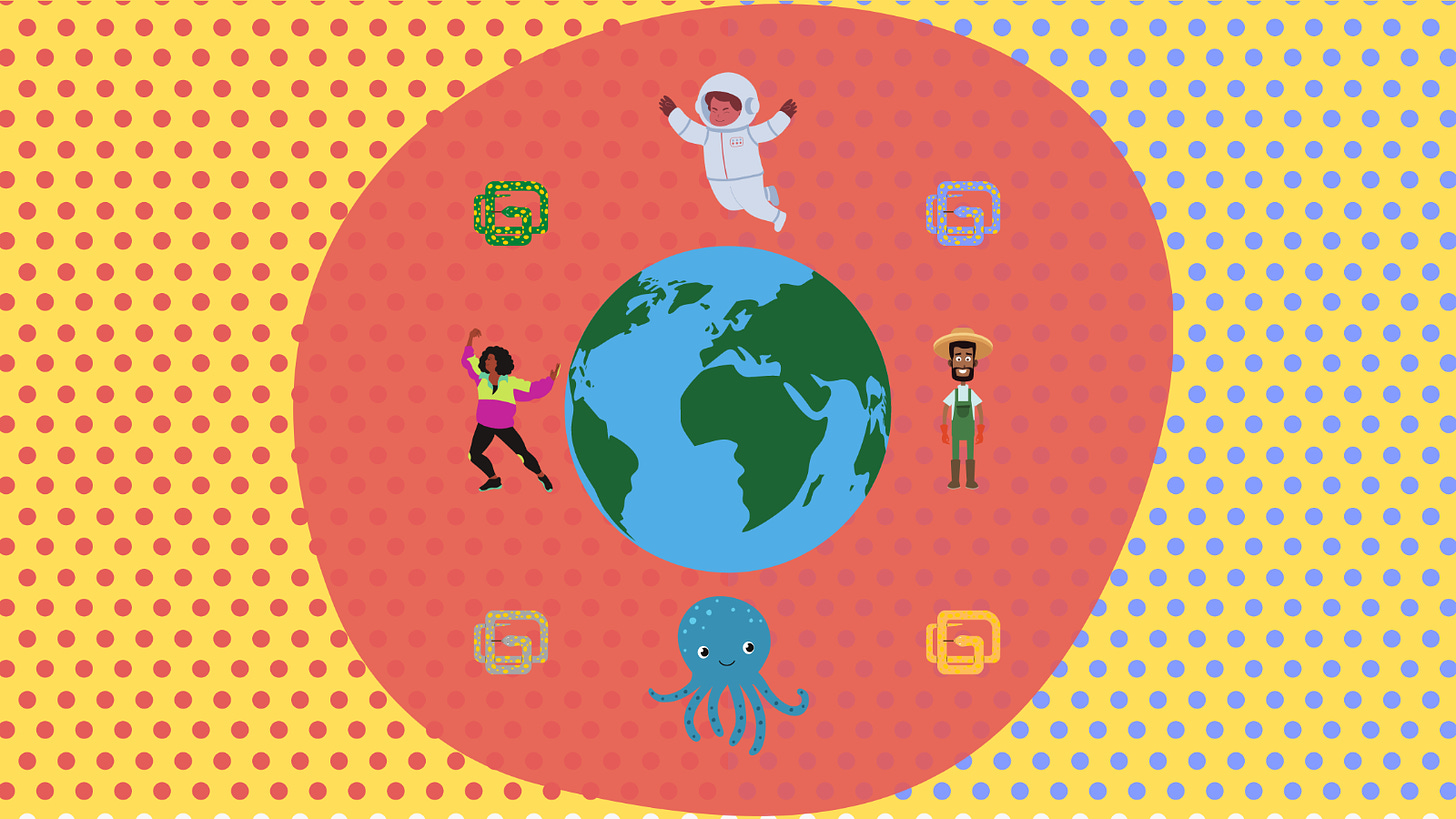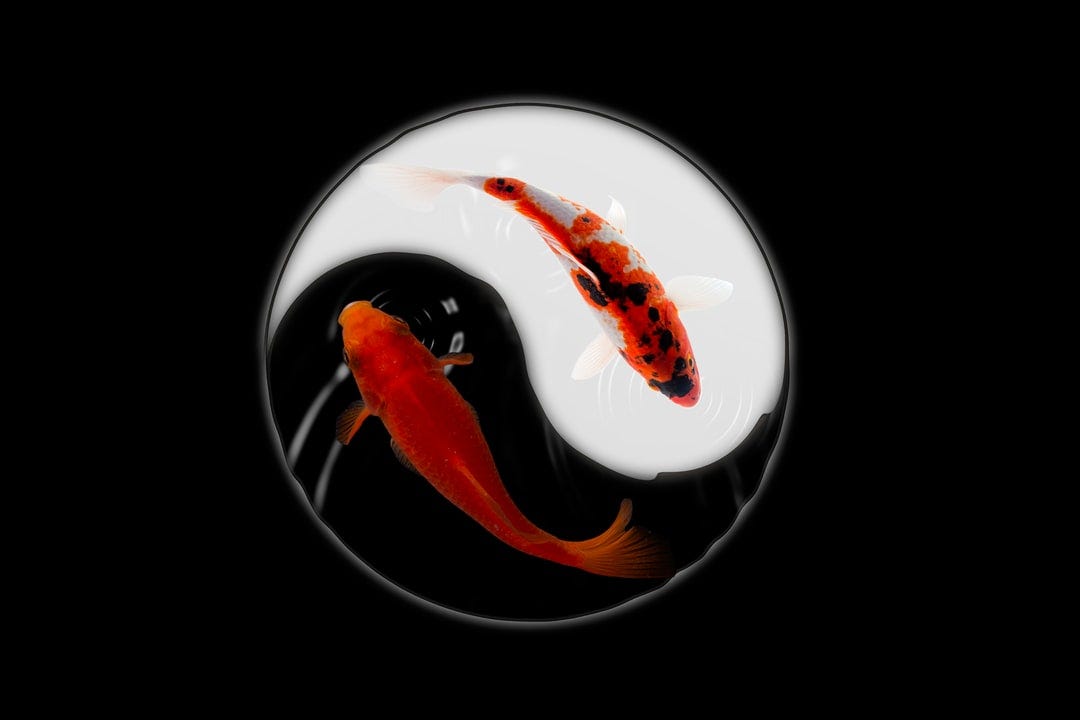M9: Formalizing Identity III
On 'Wespace' -- a way for presence and continuity to emerge on the internet
Note: last essay of the year so
extralong.
A New Medium
I remember being surprised when I read about 'mediums,' people who channel spirits of ancestors and dead dogs to those willing to pay. But upon consideration, isn't that what a medium: an intermediary who stands between you and whatever you seek?
Every medium comes with a dilemma: it expands the world through acts of representation (so that we can see or hear objects and events that we otherwise wouldn’t) and simultaneously shrinks our world by alienating us from our immediate environment, so that at the extreme, we a inhabit matrix that has swallowed reality.
A medium is connection and alienation in the same package.
When a medium has had a long run, like the written word, or even photographs, our experience of its powers stabilizes and we have a better understanding of what it means to inhabit that medium's world; we can be objective while evaluating what that medium can connect us to and what it alienates us from. But what if you’re living through a revolutionary change in media?
That’s what has happened to us with the internet, which is the greatest disruption in the media landscape since the advent of the printing press, and just as Gutenberg's children lead us to the end of feudalism as well as religious wars, the future of the internet is also the future of politics, the future of art and so on. The internet might be normalized in a hundred years, but for now the fate of all human activity is tied to that of cyberspace.
I certainly experience it that way.
The fall of the Soviet Union, the acceleration of globalization and the dawn of the internet all came together in a rush and I was young enough to experience all of them as in a dream. All other things being equal, the internet is the single biggest shift in my lifetime - everything I have done since the late 90s has been shaped by being online. I have experienced both extremes:
1. An internet that liberates, connecting me to people, places and ideas that would be impossible otherwise.
2. An internet that oppresses, captured by large corporations and authoritarian politics.
Of late, I experience the second a lot more than the first. And let's not forget the internet is the informational Yin to the energy Yang, and we are embedded in both webs at once. That future goes by many names (mostly in the internet web, the energy web doesn’t seem to spawn radical imaginations in the same way): Web3/Metaverse/Interverse….
And this season of essays is my effort to separate the snake oil from the genuine revolution.
Two Dreams
There are, in essence, only two dreams about the internet:
1. I have access to the world's knowledge on my fingertips!
2. I have access to the world’s people on my fingertips!
Of the two, the first seems much more ‘device-like’ than the second for what we are looking for is a hand-held electronically enhanced book that holds all the world’s knowledge and makes that knowledge available to me when I want it or even anticipates what I want. I even gave a TEDx talk about this many years ago:
The internet has undoubtedly become better at information gathering in the past two decades (both real and fake) and even though much remains to be done, we have excellent hardware and software interfaces to the world’s knowledge (Google + iPhone/iPad) that go a long way towards solving the knowledge problem. But only if you consider knowledge gathering as an activity that ends with a static list of facts, truths, principles etc. Such as:
✅ Earth goes around the sun.
✅ Socrates died in 399 BCE.
The holy grail of this approach is a truth generator: a machine that spits out all and only true propositions. We know that dream failed in theory (see: Godel) but Google has solved that problem in practice: it's good at listing true statements (with a smattering of falsehoods) in every domain that I care to search for. TBH, it doesn’t matter to me that the machine spits out a falsehood every once in a while. It’s good enough, which is good enough.
But 'eternal knowledge' isn’t the only form of knowledge. Consider the gazelle looking over its shoulder at that clump of bushes. He wants to know: is there a lion hiding behind the bushes? If yes, am I its most likely prey? If there’s a lion behind the bushes now, the statement ‘There’s a lion behind those bushes’ is true at this very moment and will remain so for the eternity but the gazelle only cares about the truth in this moment. The next moment will be devoted to whether the grass in front of me is worth nibbling.
There’s no permanent truth to be discovered in most situations, but there’s truth in the moment (an instantaneous truth, so to speak) that matters a great deal. IS and OUGHT have split in the shadow of eternity, but they are joined at the hip in the calculus of everyday life. With Google having ‘solved for eternity’ perhaps we can devote our energies to solving for the moment.
Enough about knowledge; let’s peer into our other dream. How might I connect to everyone alive and dead? And can we do it in a manner that doesn’t overwhelm us? We can't know everyone as individuals; the Dunbar number says most of us can be friends with about 150 people at most. Not surprising, since humans evolved in small roving bands where everyone would have known everyone else; their unique individuality would have also been common knowledge in the community. Or to put it in the language of the interverse, everyone experienced the presence and continuity (and after their death, their absence) of everyone else. Presence makes haecceity easier.
As a refresher, here’s the definition of haecceity:
The haecceity of an individual a is the property of being that very individual, the property being a.
It’s not clear to me that pure haecceity is possible. For example, if the entire universe was destroyed except for one apple, would that apple have haecceity. The common sense answer seems to be yes: of course the property of being that apple stays as such even when all other objects in the universe disappear. But the important aspects of my individuality are all formed in relationship - an apple is an apple only because fruits are attractive to certain species.
My suspicion is that haecceity is formed in relationship, i.e., to be able to point to this object I need other objects. If I am the only person in the universe, then I can’t be named. Call it the ‘emptiness of pointers.’
The only way to be me is to be with you.
Wespace
This week’s concept world
The other day, I met someone writing their PhD on the history of Shakespeare in Punjab - in typical colonial style, the bard was introduced via the educational system ("culture") and then performed for the first time in Punjab at the Dayal Singh College in Lahore in 1903. Somewhat late by colonial standards - Shakespeare was performed in Calcutta much before - certainly by 1814 when Henry IV was performed at the Chowringhee Theatre.
It was happenstance I met that person - it's quite possible that in a slightly different universe I would have never met them. So a thought came into my head: wouldn’t it be awesome if I could spin up a world in which I could have a conversation with the world’s best comparative Shakespearean scholars? The spun up world doesn’t even have to be real - I don’t need to talk to those Shakespearean scholars live; their virtual avatars are more than enough.
I would much rather learn from talking to scholars who study the adoption of Shakespeare in various Indian languages than from entering abstract search queries, i.e., instead of entering a Google search term “When was Shakespeare first performed in India?”
If the Registry from last week was up and running, I would have spun up a world that loads the avatars of scholars I wanted to talk to and I would then engage in a virtual conversation with them (and let the world sink back into the virtual depths when I am done). That’s what I call WeSpace - a schema through which a virtual world with virtual avatars can be spun up on demand, but one that has all the knowledge of human individuals - aka the Registry - in the backend.
Wespace would be a virtual halfway house between the Google of today and the gazelle’s dream engine -
+1: it creates virtual agents that answer my instantaneous queries
-1: it won’t prevent me from being dinner.
The Gazelle would prefer a robot that scares the lion away, but we can’t yet print material good instantaneously.
Still, pretty cool isn’t it?
This essay is the last long letter of the year - I will write a summary next week to cover the main points of the ten posts so far in the interverse series. If you like what you’re reading:
Also:
What Covid did for the Interverse
Wespace isn't as futuristic as my description makes it out to be. I have been stringing together a handmade version during the pandemic. Zoom saved my life last year; with the world shutting down, I was wondering how we would get our work done and how I would be able to keep tabs on my parents back home, and I started scheduling regular Zoom calls with everyone who mattered. Zoom is great for talking with people whom you love and/or respect, for live video transmits much more than voice - facial expressions, gestures and screen sharing give more depth to the remote experience than mere sound can. The presence in Zoom calls is pretty good. An expanded version of video conferencing in which we interact in 3D spaces will lead to more depth, immediacy and connection -if used judiciously.
But that extra depth isn't always good! I started experiencing serious Zoom fatigue around July 2020. After several months of daily video calls that lasted for hours, I started getting headaches and blurry vision. On many an occasion, I found myself turning my video off and listening to the conversation. But listening to a call where you know the video is available in the background is different from a phone call in which no video is there to be seen. Like many, I was playing with a combination of presence and absence online.
The advantages of abstracting white collar work from physical presence have become clearer and clearer over these twenty four months. I experienced (and helped create some) rudimentary Wespaces while the virus was raging outside. With most people in my demographic spending their days online, their time, energy and attention was no longer in meatspace. It became possible to organize impromptu seminars between Bangalore, Bogota, Boston and Berlin. The shift wasn’t technological as much as psychological. We had Zoom back in 2019, but attention is a fickle customer and the vast majority of scholars and academics were rooted in their physical environments before the pandemic made their department lounges as close or far as the colleagues on other continents.
I found myself in several reading groups and online experiments; I experienced persistence without having to step into VR - just the weekly routine of Zoom calls with chat messages on Slack channels and Whatsapp groups made these distributed communities ‘real’ in a way that I never felt before the lockdown. Some knowledge activities are actually easier to do online than in the real world:
Working on a document (both synchronously as well as asychronously) - if done well, it has the feeling of clay changing form on a potter’s wheel.
Reading texts line by line: it’s the most boring thing to do in a physical seminar room but is surprisingly pleasant while screen-sharing; especially if we can mix reading with commentary.
Still quite far from Wespaces if that means instantaneous communities spun up on demand, but enough of a taste of that experience that I am willing to invest time and energy into seeing how they could be created programmatically. Even an evolutionary step that:
Aggregates all my Zoom and Meet calls with automatic transcription
A document creation interface that allows me write and curate at whatever length I see fit: from tweets to books
Deep integration of all calendars
Exposing as much of the above three to the world as I choose to expose (say as my personal website or social media profile)
Just these alone will deliver enough of a sense of my individual presence and continuity that it will be a substantial first step towards a human-human internet. And I can already see the impact of such a storehouse upon my identity: each space will demand a slightly different self from me, with both continuities and differences across spaces. I might have access to a dozen such spaces in the physical world, but the digital world might make it easy to participate in one such space every day. But the aggregator will bring them together into one space. It will be a struggle to keep it all together. All of the above might be wishful thinking, but the real transition in the evolution of the internet is the following:
Instead of tracking machine state, it should track human state.
I know, tracking human state is also the premise behind the surveillance economy, but that's precisely the point: the capitalists and the state surveillance agencies have long known where real value is generated on the internet; now the goal should be to make that value public. That, in turn, will lead to a new dance of presence, continuity and haecceity that I can only speculate about.
Presence, Continuity and Haecceity
When the internet first burst into the cultural scene, it was a wide open space with people expressing their individuality in hitherto unknown ways. It didn’t matter that your writing didn’t meet the standards or the style of the New Yorker - you could set up shop on Blogger and broadcast your words to the world. You can still do that, but we have finite amounts of attention and most of it is sucked up by large corporations that want to benefit from your eyeballs. The only ways for most people to capture attention are:
Pay money
Do something extreme
Post naked photos
None of these are conducive to human dignity, which depends on you being appreciated for who you are and not the photos of your feet under the toilet stall you posted on Instagram (yes, that was a real meme in my daughter's high school). Ironically, a technology that led to an explosion of creativity and individuality in its infancy has since become the largest vehicle for alienation ever.
The recognition of individuality is one of many ways to create a better internet, one in which we can maintain presence (say, a representation of us with some depth, both in the literal sense of having 3D capacities and metaphorically, by opening a window into our soul) as well as continuity (i.e., an identity attached to me across platforms and secure enough that I can be anonymous when I choose to and public when I choose to be out in the open). It's a localist version of the internet in which I am in richly endowed spaces with a small number of people of my choosing and in which I get to develop my character and identity in rich ways.
The interverse is beginning to make that claim real with presence and absence in virtual environments. As we go back to virtual analogs of the small bands in which we evolved (except that we could be part of more than one of them, unlike our distant ancestors) we might experience the forming of unique individualities in close to real time. Already, most young people who spend (waste?) time on social media are performing their identities 24/7, but as these trends deepen, I bet we will get used to the idea that identities are fleeting and not worth getting attached to.
The current liberal model is that everyone is entitled to whatever identity/identities they choose but the assumption is that this is a stable set, and therefore the ethical dilemmas and debates are about issues like multiculturalism. But when we are donning and doffing identities like clothes, the ethical dilemmas will be about how one is supposed to switch out of these masks. Just as technology is getting to the stage when our haecceity might be accessible to representations, the very concept is being undermined: if the individual is constantly mutating, what is the point of studying the property that makes them unique?
We will need a variable form of haecceity to describe this new reality.
A Final Word

It’s in the very nature of media to connect as well as alienate, to expand our capacities to see and hear and feel, but at the same time disconnect us from the world. In the absence of any media, the only way we see another being’s uniqueness, their haecceity, is by walking up to them, passing one’s fingers over their surface - in short bringing one’s full bodily being to that encounter.
And here we are, thousands of years after the invention of text and all its alienation, with the promise of a new technology that will help us encounter strangers without being in the same room. Is that possible?
Can we peer into someone’s soul in the Matrix? And if we can, does it mean the soul is as much a mirage as the body?
The answer to such questions, lies in the infamous Zhou Enlai quote "it's too early to tell." But there's something worth telling today:
For the past two-three centuries, people have been inscribed (i.e., marked, counted, measured, tabulated, aggregated, regulated, disciplined) mainly in one of two ways:
Through the mechanisms of the state
Through the mechanisms of the market
Of the two, it's the state that has dominated discussions of identity, i.e., matters of citizenship, belonging etc. But the flows of energy and information of the last few decades have laid bare the flaws of state driven identity: we form and break connections at too fast a speed to be inscribed in the old manner.
So how we do we make identity more responsive to the speed and scale of our current attachments? How should we be inscribed now?
One answer comes from the libertarian market cult: make the internet of money universal and create a trustless system in which tokens regulate all collective acts. In the extreme version of this scheme, all of government will be replaced by smart contracts. Imagine armed drones showing up at your doorstep ten minutes after your electricity bill deadline and you have a visceral sense of how this can go wrong.
Another answer comes from the ongoing Chinese experiment: make the state all-pervasive, i.e., not just (or only) totalitarian, but also deployable at a moments notice in relatively benign situations. Which is to say, the state isn't deployed at a distance, but is an active organizer of society at every scale: from the micro to the macro.
In both the libertarian and the statist solution, there's a mechanism that regulates social life on an ongoing, minute by minute basis and therefore, there's an all pervasive organizer of society. So far, only two ideas have been floated: let it all be organized by money (which then becomes the measure of all things) or let it all be organized by an amoeba like state. Is there an alternative to the Money/Mao duo? If this level of round-the-clock organization is inevitable, can be done in a manner that promotes flourishing?
The answer to this question also lies in the Zhou Enlai quote "it's too early to tell."
Some such circadian rhythm or metronome seems necessary for the complex world we inhabit. It can be centralized or decentralized; democratic or authoritarian, though I suspect that all of these terms are at best approximations to the concepts we actually need to describe our situation. Looking at all these attempts at regulating social life from a distance, they appear as dilemmas of order: how one creates and maintains it. And what does one do when the traditional mechanisms for creating and maintaining order start to fail?
Create new mechanisms.
Whatever you end up calling the new mechanisms: social credit, Web3, Metaverse, Interverse, they are one of many names for our current condition. These technologies are both signs of that condition and solutions to it, and we don't have to agree with the solution to recognize the existential need from which it arises. As I said at the beginning of this article: the future of the internet is the future of all society and we better start thinking about it this way.








